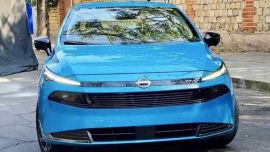President Javier Milei tells anyone who asks him that he wants Argentina to be like Ireland in 45 years time. But what if the mirror for Argentina’s future is Nigeria instead?
The West African nation has just seen 10 days of protests by groups opposing the pro-market, investor-friendly reforms introduced by President Bola Tinubu last year. Protesters complained about the high cost of living. They have reasons to – Tinubu started his administration in mid-2023 by sharply devaluing the currency to merge the official and parallel exchange rates and let it float. The naira has lost around 70 percent of its value since then, and inflation has reached a 28-year high.
Sound familiar? In Nigeria, many observers have been watching Milei’s first months in office to compare them with Tinubu’s, whose term started only six months earlier. Both the similarities and the differences are striking.
While Tinubu’s critics praise Milei’s anti-political “caste” behaviour for reducing the number of ministries by half, the Nigerian president enlisted 45 ministers, making it the largest cabinet since Nigeria's return to democracy in 1999. Tinubu did cut the fiscal deficit though, by reducing government subsidies on fuel, but he is still far from the budget surplus recorded by Milei in the first six months of his administration.
In other matters, however, Tinubu has been even more libertarian than Milei. Letting the currency float freely is something Milei seems increasingly unwilling to do, as he fixates on the key political goal of showing that inflation has gone down month by month. This week, government spokespersons, some in private but some even in public, celebrated that the country has survived the recent global market unrest thanks to the ‘cepo’ capital controls.
The size of the protests that Tinubu faced this week, which left at least 21 people dead according to Amnesty International, is exactly the reason why Milei is becoming increasingly conservative about introducing his full open-market ideology to Argentina’s damaged economy. Milei’s approval ratings continue to be solid, even as the average of all polls went down slightly in July, to 47 percent.
More structurally, for Argentina to become Ireland or Norway instead of Nigeria requires a strategy regarding the management of the country’s resources. Milei was clear about his take on this issue when he penned in one of the 10 bullet points of the May Pact signed on July 9 that the country must “exploit its natural resources.” This statement is backed in legislation by the RIGI pro-investors scheme and the President’s first visit to Vaca Muerta this week.
Enter Paolo Rocca, chairman and CEO of Argentina’s largest manufacturing conglomerate. The domestic business establishment has been very supportive of the Milei administration, but Rocca now says that maybe they were “overly optimistic” about his chances of fixing the economy quickly. This week, at the annual Brazilian steel industry event in São Paulo, Rocca warned about the “commoditisation” of Latin American economies, especially in their relationship with China, and how the fact that they are not adding value to their resources “has and will continue to have a negative impact on the governance of our countries.”
That’s why, at least in principle, somebody like Rocca should oppose RIGI: he would not want Argentina to go the Nigerian way, becoming a country that exports a lot of oil and imports a lot of fuel because it does not have the refining capacity to do so itself. While dysfunctional for most of the people in big countries like Nigeria and Argentina, a commoditised economy could be self-serving for the ruling elites; of course, if they can contain the public unrest that comes with it. The Nigerian version of Rocca, Africa’s richest person Aliko Dangote, has just finished building the continent’s largest refinery to cover the country’s entire domestic fuel needs, but is struggling to get local authorities on board given the vested interests that exist in keeping the “commoditised” status quo.
The RIGI scheme places Argentina closer to a category that experts call an enclave economy, one in which some sectors boom but the larger public is not necessarily attached to the benefits. Nigeria is a prime example. More of the leadership are reacting to that. This week, three of the country’s most powerful governors from the rich Pampas region made that exact point: Maximiliano Pullaro of Santa Fe, Martín Llaryora of Córdoba, and Rogelio Frigerio of Entre Ríos, said that the national government needed “a policy of economic development.” Rocca also has his steel business attached to the manufacturing sectors in the region. They might sooner rather than later form a common front.
* Marcelo J. García is a political analyst and Director for the Americas for the Horizon Engage risk consultancy firm.























Comments